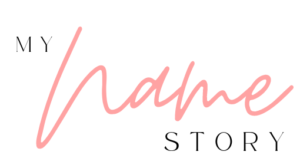
DO YOU BELONG TO YOUR NAME?
My Name Story is a portrait-video project that examines the AANHPI experience through the lens of our names at the intersection of race, gender and class. This project explores themes of identity, belonging, and reclamation in a country that oftentimes labels AANHPIs as the other and perpetual foreigner. The project includes women from different generations, ethnicities and experiences who have had, at one point or another, struggles with their names and the meanings attached to them.
The Stories
Participants of My Name Story were asked to share the stories of their names through portraits taken with a photograph of themselves that represent the story of their name. They wrote letters to the version of themselves that they were photographed with to help them process and reflect on their name stories. Video interviews were conducted with each participant.
Portraits and transcribed excerpts of their interviews are available for most participants. Click on a portrait to read each woman’s story. Full interview videos will be available in the future. Meanwhile, watch short clips from the women's interviews above.
Jeannie Liu
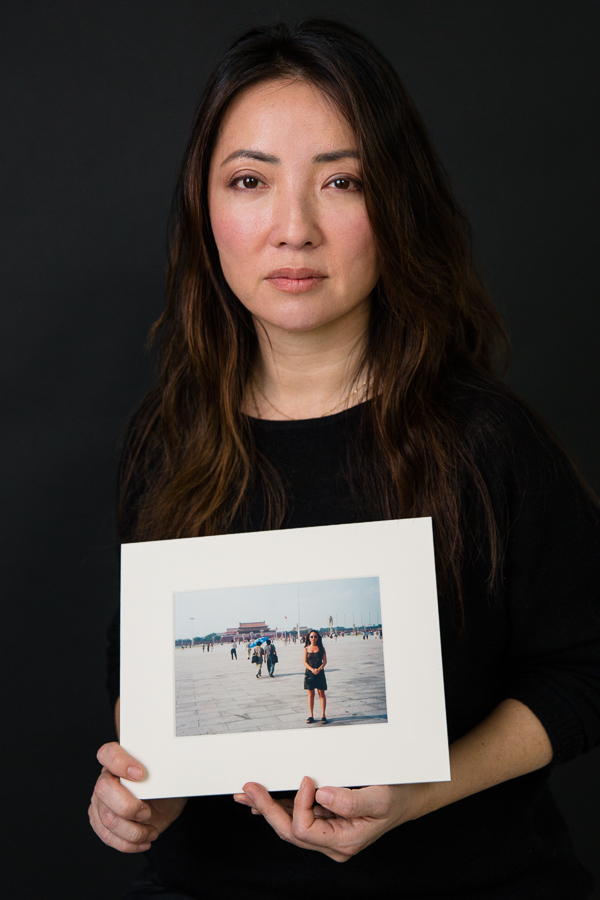
I thought that maybe for the first time, I would feel this connection to a land, to a people, to a place...I felt very much far away and ultimately, this is how I’ve kind of felt my whole life.
A month after we moved to the US, my parents decided to move us all to Georgia. When I started school that fall, my mother was talking to a neighbor of ours and she asked, ‘What's going to be her name at school?’ My mom said, ‘That's obvious―Zhen Yi’ and the neighbor says, ‘You can't possibly name her that because she's never going to fit in.’ So my mother asked what my name should be because not really speaking English, there's no way that my parents could have come up with a name. My name being Zhen Yi, my neighbor thought, why not Jeannie? As old as I am at 44, I should have, at this point, really enmeshed myself with that name and I haven't. I just don’t identify with it. I've just sort of accepted it.
This picture was taken shortly after graduating from high school and we got an opportunity to go to China. I had high expectations. It's like a motherland for us and for any of us who are Chinese, who were not born in China but feel this kind of pull to go and visit and see where we're from and our history and and all the places that my parents or my grandparents talked about… I thought that maybe for the first time, I would feel this connection to a land, to a people, to a place. Truth be told, I didn't. I felt as much of a foreigner as I did coming to the US the first time or even going back and visiting South Korea. I felt very much far away and ultimately, this is how I’ve kind of felt my whole life…this kind of a separateness and distance from myself and everybody else around me.
Siemny Chuon
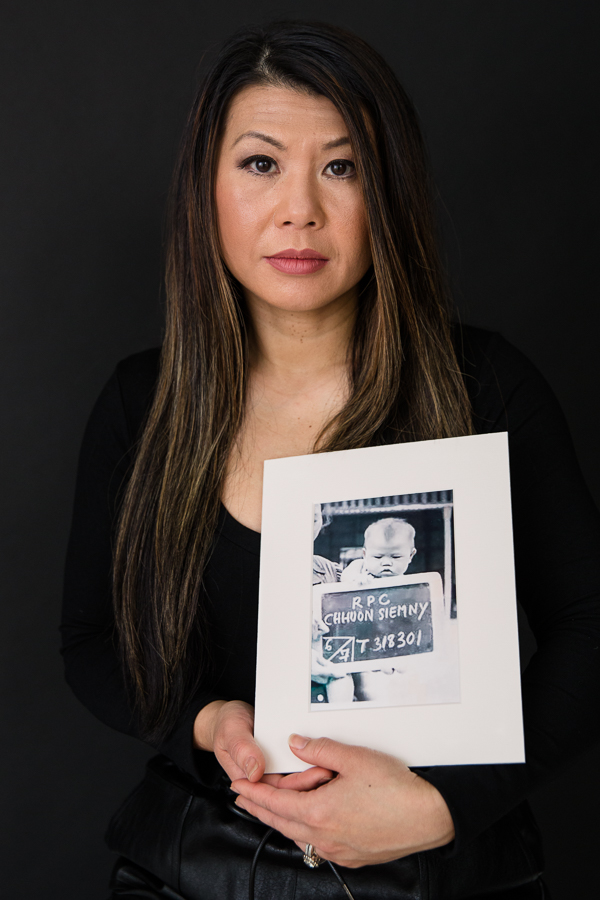
I always felt uneasy about having changed my name. I felt like I was a sellout. It was always a source of shame for me. Honestly, it was a reminder of how I couldn't stand up for myself.
When I entered my career, I was really proud to be one of the few Cambodians working in TV news (Kiro7) and I knew that it was a source of pride for me, but also a source of pride for my community. It was made clear to me that in order for me to accept this job, I would have to be okay with changing my name, that I would have to accept this as a condition of employment.
I always felt uneasy about having changed my name. I felt like I was a sellout. It was always a source of shame for me. Honestly, it was a reminder of how I couldn't stand up for myself. But I still wanted to be proud of being Cambodian and proud of my refugee roots so on World Refugee Day, I wanted to share that I am a refugee. I found a baby picture, one that was taken of me at the refugee camp before we came here to the United States, but in that picture there's also a small chalkboard in front of me that has my name on there, Siemny Chhuon, and also some numbers associated with my status. I wanted people to know that refugees matter and I wanted people to know that refugees are among us.
But I also felt really uncomfortable because then I would be opening up more questions because people knew me on air as Siemny Kim, even my coworkers. It was nothing that I'd ever discussed publicly before, so I felt really uncomfortable about opening up that conversation and I wasn't ready. I wasn't ready to admit publicly that I wasn't strong enough to keep my own name. So instead, I cropped out my name and I just shared the baby picture.
Maridelle Levya
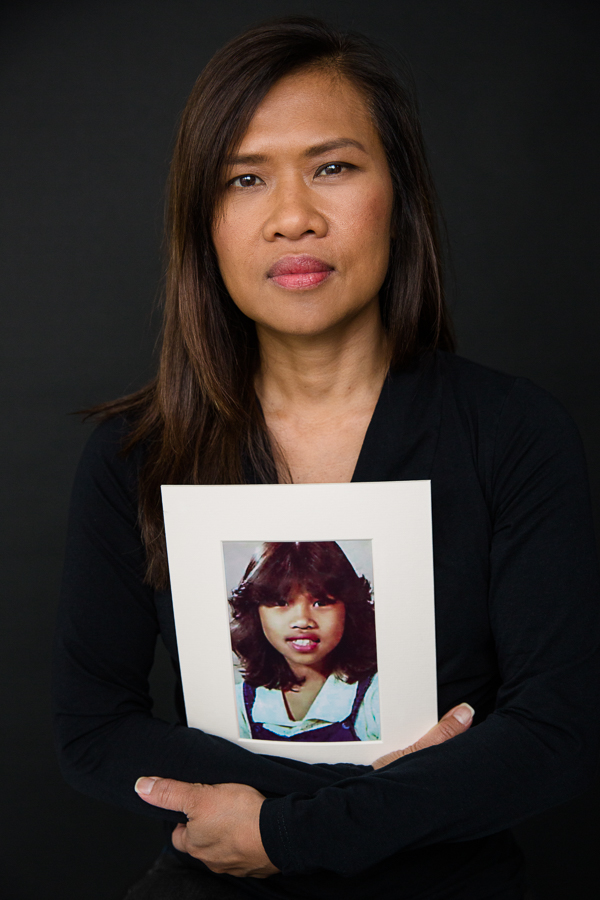
So though my mom had told me, don't let your skin get any darker, that was the first time that I realized everyone thinks brown skin looks like dirt. I just remember feeling like I was ugly and I would always be ugly.
I got to be really aware of noticing all of the differences, all the things that aren't ideal. I didn't want to be who I was...I've only dated white guys so I knew I would marry someone white. Growing up I thought, oh, I'm not going to take my husband's last name but I definitely did and one of the reasons is that he has a very American last name...and even after getting divorced, I kept that last name. I liked my identity, at least my name didn't sound Asian or Filipinio.
What it has meant for me to change my last name back to my birth surname really has meant this kind of autonomy, an independence and starting that journey of accepting who I am, who I was when I was born, my heritage, where I came from. And the irony is, if you think about autonomy and where I came from, being Filipino means that you have a heritage of colonization and not being autonomous and free. I have a Spanish based last name now. What was a Filipino last name 500 going on 600 years ago? I don't even know.
Annah Kim Nelson-Feeney
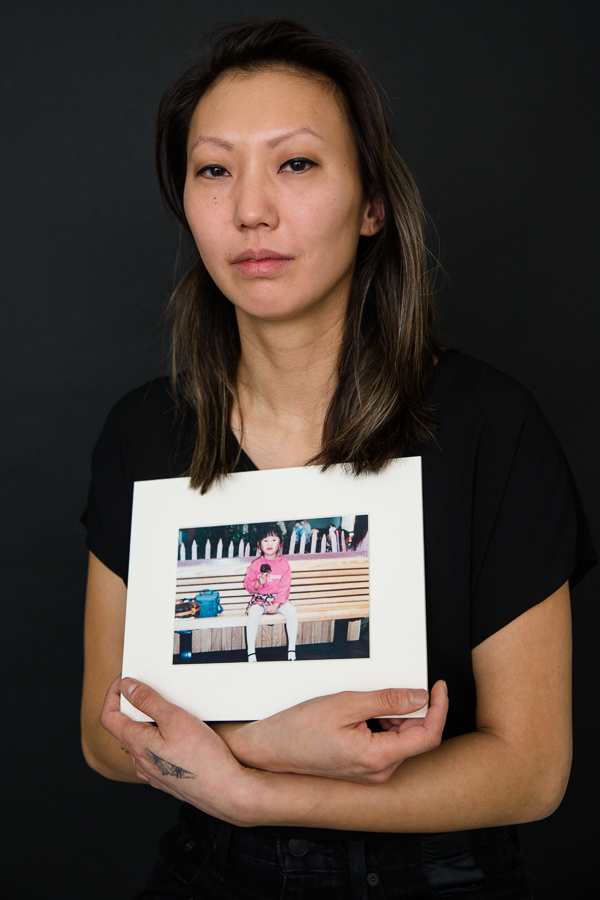
Maybe it's in the last year, very recently, that I decided that I'm Korean. It's for me, it's not for anyone else. I don't need to prove it to anyone.
Each part of my name has a pretty significant gravity to it for a variety of different reasons. Annah Kim, or Kim Annah, that's my Korean birth name which implicates a lot of trauma, being abandoned, adopted, so on and so forth, all the race pieces kind of tied into that. We have Nelson which comes from my mother and it's crazy all the things that she's gone through and then Feeney, that comes from my dad who was bipolar. I really have no reason to ever speak to him ever again. Every every single part of my name includes some really intense form of trauma. I would feel worse if I removed it. That is just part of who I am today.
I've always really liked my name for a variety of reasons but it's shifted over the years. As I got older, I really wanted to reclaim more of the Korean parts of it, like the Kim Annah parts of it and incorporate that into my own kind of view of what is Americana. Because in my mind Americana is much more just of a really immigrant story and I feel like my name is strangely, a very strong immigrant story in a variety of different ways.
Rya Wu
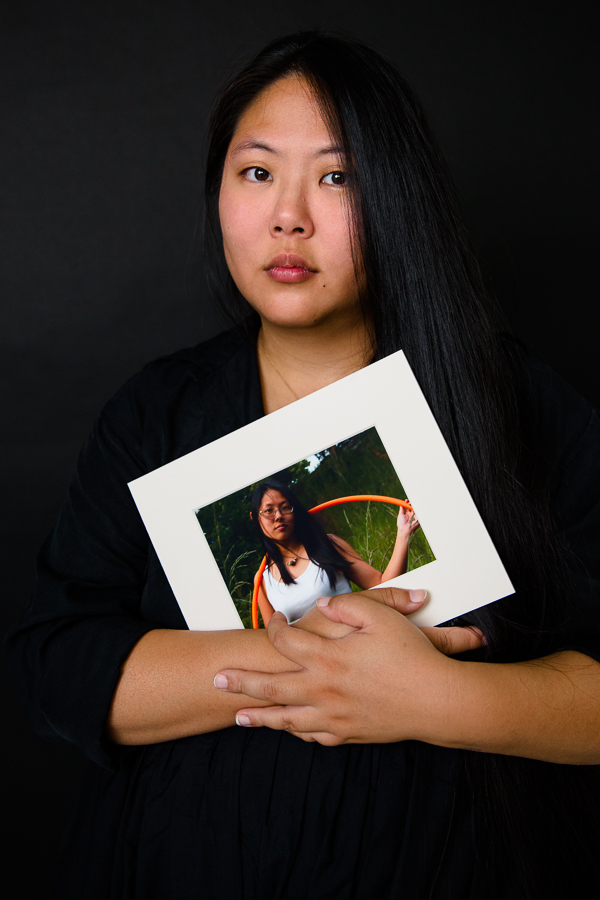
It was just like one of the hardest points of my life and all of that is very much embedded in the name Tiffany for me.
My name is Rya. I changed my name in 2021. It started with the name Ryan and eventually I dropped the 'n' and I was like that, that feels like me. But Rya, the name, means dream or free-flowing river and it's based off of the Greek name, Rhea and I love my name Rya, It feels very affirming.
When I hear the name Tiffany, I honestly hated it even just saying it out loud right now I get this like creepy crawly feeling on my back. I feel like I've been conflicted with my name, honestly, my whole life...
I selected this photo because I really wanted her to be seen and I think she really deserves to be seen. And she did a lot for everyone even when she didn't have much to give. I remember one day I had talked to my mom and I was like, "hey mom sometimes I feel like, I don't know, maybe I shouldn't exist and I don't know what would happen if I like disappeared" and my mom was like, "oh, everyone thinks about that." And I think she was trying to normalize it, but it just felt really dismissive and so I think during that time, I just felt really invisible.
Gina Marioni
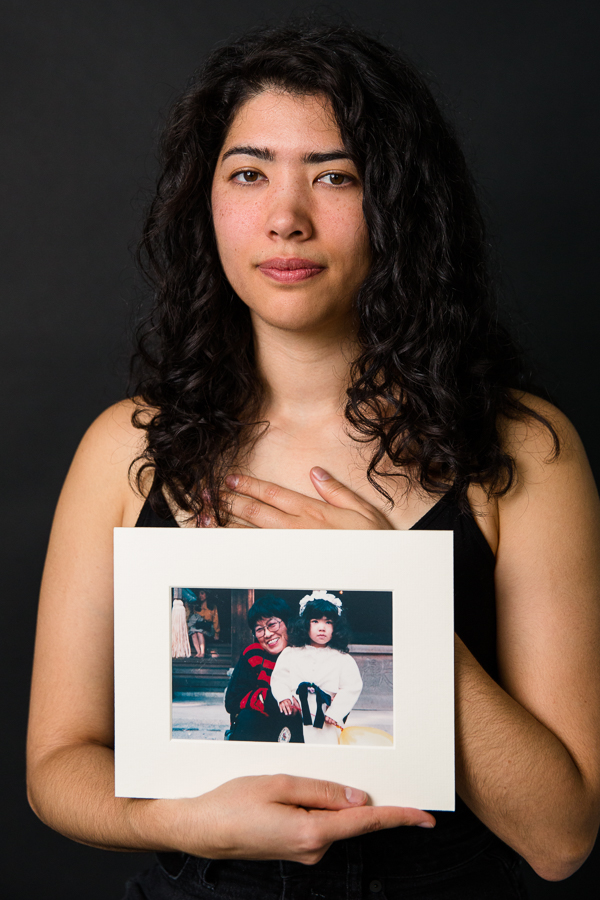
But seeing Gina Ariko, it felt like every time I had to sign my name on a painting, it felt like it was me and her. That gave me a lot of courage because I know she was a working artist too, a working artist in late 1960.
On my dad's side of the family, we would regularly get together and that whole side of the family is fully White except me and my sister. But then when I'd go to Japan, I’m mixed race and so I would stick out also. And that is something that I was aware of, part of a self-consciousness I had.
My Japanese grandparents were both professional artists. They don’t speak English and I speak a tiny bit of Japanese and we had a language barrier. But we could draw next to each other. It was an easy way to spend time together. So when I was younger, it definitely made me feel like, I like art and you like art and that means I fit in here, when there’s distance and language and other things that made me feel insecure about my enoughness, in my Japanese enoughness.
I had to do a senior year art show and my advisor was the Head of the Art and Art History department so he had the highest ranking at the University. He was this old white man and he was very demeaning toward me. He just straight up did not like my artwork and let me know that he didn't think it was good enough. My show was almost exclusively portraits of women in my family in Kimono so it was extremely personal. I left that meeting and sobbed. My whole childhood I wanted to be an artist. By the time I left university with an Art degree, I did not attempt to pursue being a working artist. I left school thinking this is not possible.
Xin Xin
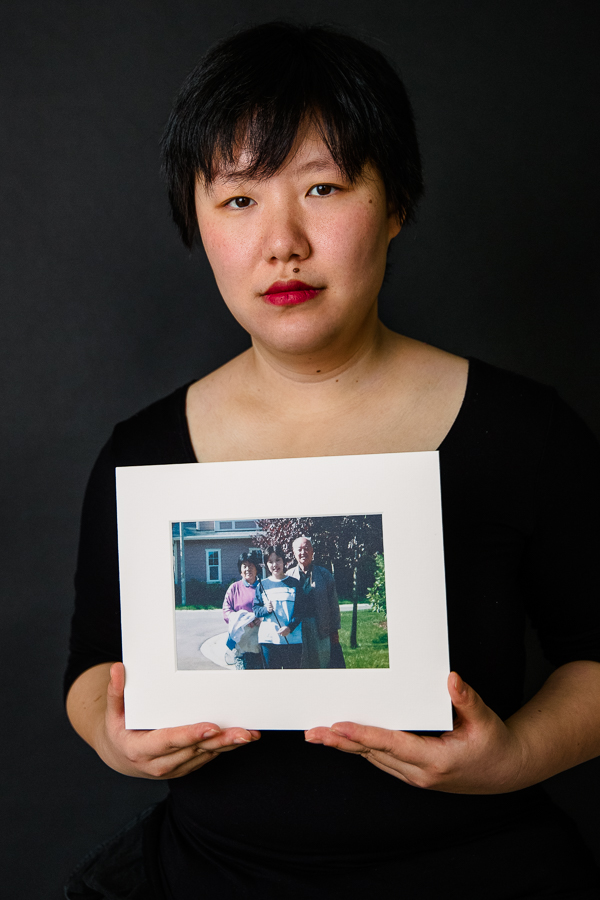
The only emotion I can remember is anger. Anger is the first layer but, underneath it, I think the anger came from not being able to have any control over my own life.
In China, I lived with my grandparents and my mom came to the U.S. when I was in the third grade to pursue her MBA. When I was 12 years old, in the middle of sixth grade, I was told to prep for an interview for the U.S. Embassy to get permission to go live with my mom in America. They also shared that my mom had gotten remarried and they didn't share a lot of details of who the person was. When I got here, it was very weird, awkward. I got to meet my new stepdad, and he's a white person. He didn't speak Chinese. I can’t speak English.
So my grandparents and I live downstairs and my parents upstairs, so I felt like downstairs nothing felt different and upstairs, it’s a different world. I think I felt a lot of feelings of loss because it was a very big transition.
Around the middle of seventh grade or maybe eighth grade, there was a conversation about having an easier name for people to pronounce. At home, my stepdad had a pronunciation issue and would call me Zin Zin and I never really cared to correct it. I didn't pick an English name because I couldn't settle. So I just kind of went with however they wanted to call me because people had such a hard time pronouncing it and hard time remembering who I am. It almost felt like I started to dislike this name. Why is it so hard? Why is it spelled so weirdly? And who starts their name with X? I think the complications this brought to my life made me almost resent my name.
I eventually just changed my name to make it easier for people. I would tell them my name is X squared so that they could remember me. I think it was almost like you become invisible for so long, that the only hope is for people to remember you.
Annya Pintak
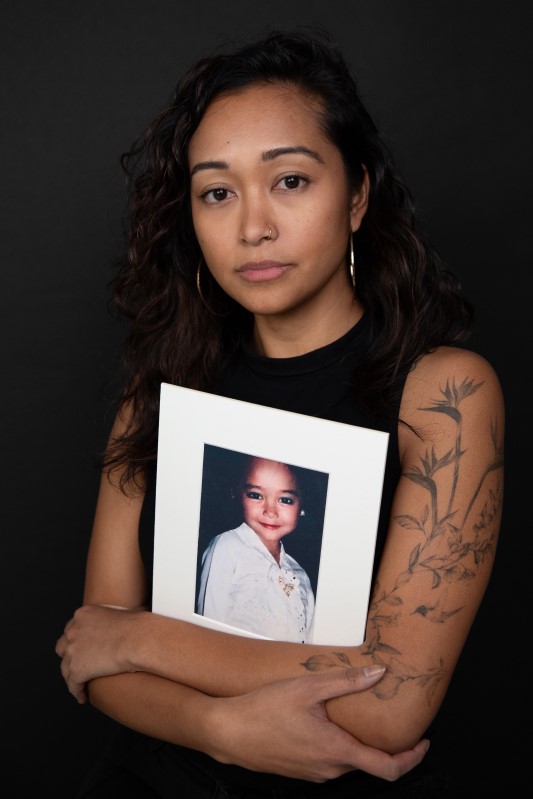
Yaminee Patel

My Name Story Exhibtion
The Name Story Exhibition will be held during the month of May in honor of AANHPI Heritage Month. The show will feature the nine core name stories from the project as well as 20 additional community name stories and art.
May 02: Opening Reception @5-8pm (part of Pioneer Square Artwalk)
May 11: Story Sharing Circle @1-3 (come share or listen to stories, free tickets here)
May 18: Guided Meditation Workshop* @1-3 (sliding scale tickets here)
May 25: AANHPI Market Day* @1-4 (+ Music by DeShawn Rivers & Scavenger Hunt)
May 30: Closing Reception @5-8 (Short Documentary Screening, Panel Discussion, Acoustic set by LaFonda
The exhibition will be at Nino Studio in Pioneer Square at 316 1st Ave S, Seattle.
*A percentage of proceed benefit Make Us Visible WA.
The exhibition is made possible by community donations (gofundme button below), Nino Studio, and 4Culture.

My Name Story Featured in Past Exhibitions:
Have You Eaten: An AAPI Group Show, Pioneer Square at Nino Gallery - Feb 2024
Have You Eaten Meryenda: An AAPI Group Show, at Kasama Space - April 2023
Have You Eaten: An AAPI Group Show, at Slip Gallery Belltown Jan-Feb 2023
About Us
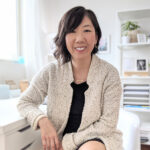
Judy Lee
Judy Lee is the creator of My Name Story and began this project when she started thinking about her own name story and how it’s been a reflection of her struggles and journey with identity and selfhood in the context of larger questions about race and gender. She started the project to help her process her own name and to create visibility for a common, yet not well known, AANHPI experience. She believes in the transformative power of stories, especially those told by the marginalized, and the importance of telling them in our own voices, rather than through an outside narrator. She is a Portrait Artist & Storyteller of social justice focused projects that center community and healing for women and BIPOC.

Tatyana Kurepina
Tatyana Kurepina is documentary filmmaker who works with local artists to strengthen their connection to the community around them through visual storytelling. She became involved with My Name Story project not only because of her own experiences grappling with her identity as an immigrant, but because she had a deep sense of urgency to help document stories that have been untold for so long. She will be shooting and editing a documentary about Judy’s name story, while weaving in the stories of the women interviewed for this project. She hopes this documentary encourages all of us to examine the complexities of our identity and how we move through the world.









